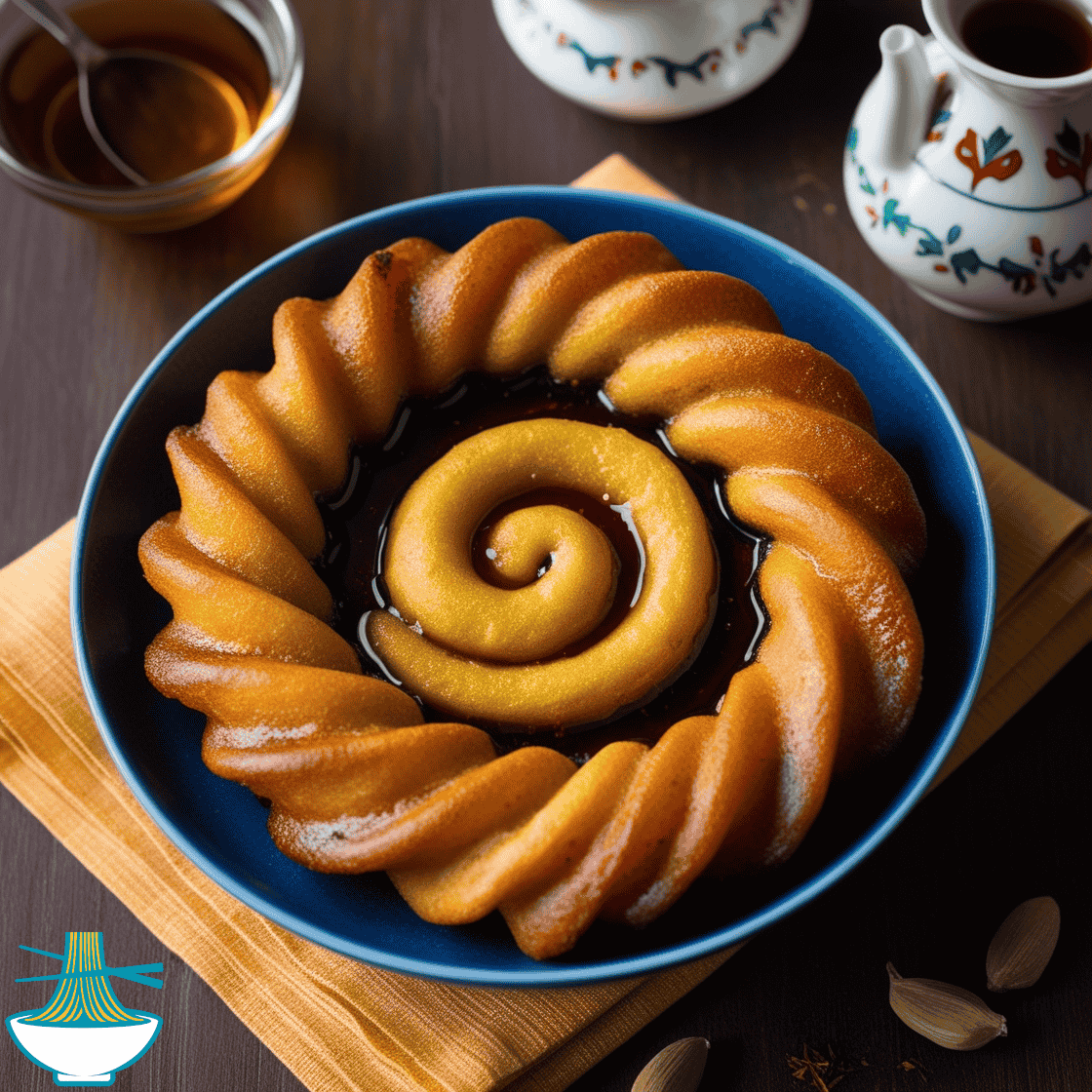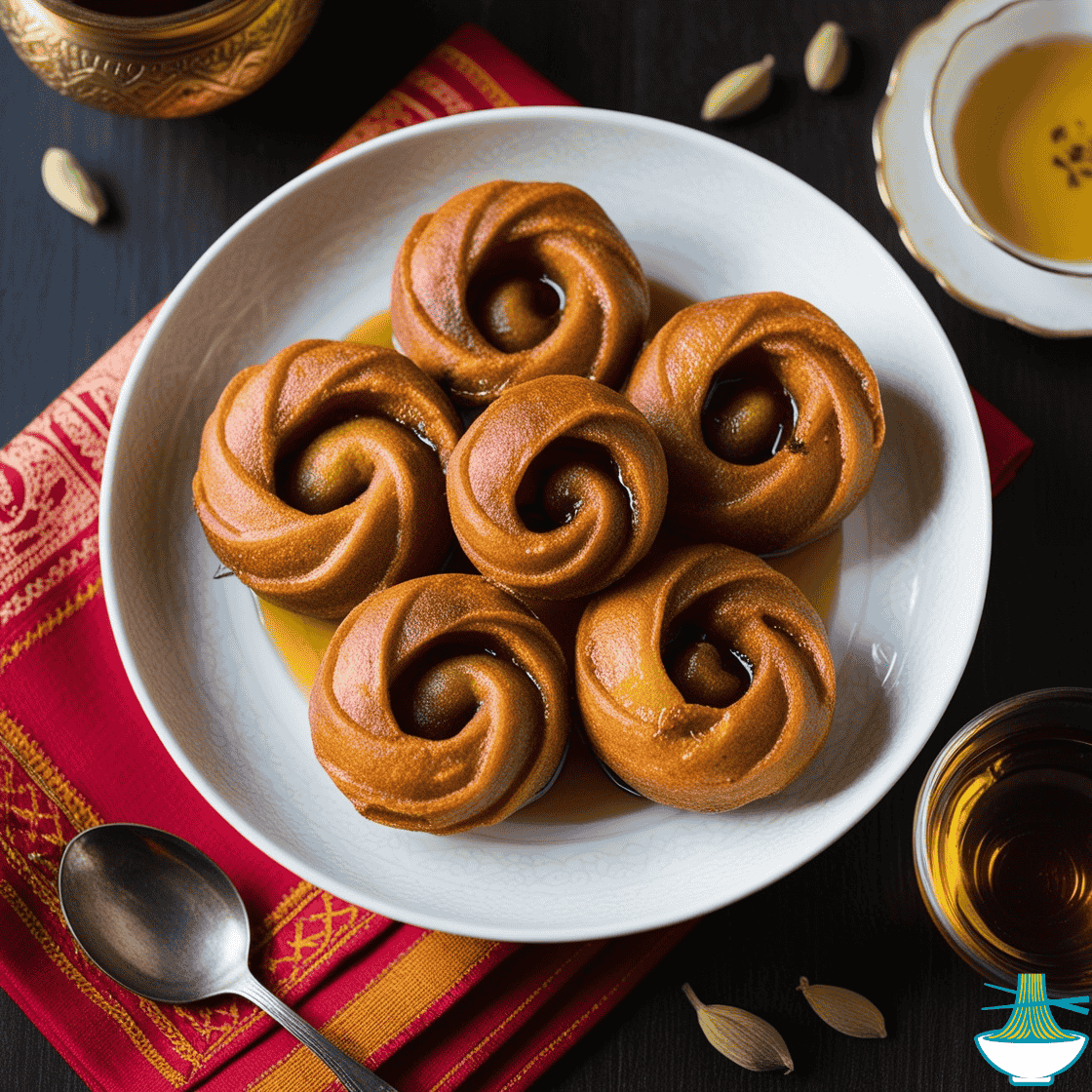Afghan Jelabi is a traditional dessert that holds a special place in Afghan culture, symbolizing warmth and hospitality. This crispy, spiral-shaped treat is fried to golden perfection and then soaked in a fragrant cardamom-infused syrup. Its unique flavor comes from a combination of simple ingredients such as flour, yogurt, and spices like cardamom and saffron. Afghan Jelabi is often served at festive occasions, religious celebrations, and family gatherings, where it’s enjoyed by people of all ages, usually with a cup of tea.

Jelabi, also known as "Jalebi" in other regions, has its roots in Persia and was later introduced to South Asia and Afghanistan through cultural exchanges and trade routes. Over centuries, Afghan Jelabi developed its distinct characteristics. In Afghanistan, it is often prepared during Ramadan, weddings, and festive celebrations, symbolizing prosperity and sweetness in life. The dish also highlights the culinary influence of Persian and Indian traditions on Afghan cuisine, while maintaining its own unique flavor profile.
Ingredients:
For the Jelabi Batter:
- 1 cup all-purpose flour
- 1/2 cup yogurt
- 1/4 cup water
- 1/2 teaspoon baking powder
- 1/2 teaspoon cardamom powder
- 1/4 teaspoon saffron threads (optional, for color)
- Oil for frying
For the Sugar Syrup:
- 1 cup sugar
- 1/2 cup water
- A few drops of lemon juice
- 1/2 teaspoon cardamom powder
- A pinch of saffron threads (optional, for color)
Alternative Preparation Options
Sugar Alternatives:
- The sugar syrup used in Afghan Jelabi contributes significantly to its sweetness but can be high in calories. To make the dessert healthier, you can replace the regular sugar with a low-calorie sweetener such as stevia or monk fruit sweetener. These alternatives provide the same sweetness without the added calories, making it a better option for those watching their sugar intake.
Yogurt Substitution:
- For a lower-fat version of Afghan Jelabi, you can opt for low-fat or non-fat yogurt. This will still provide the creamy texture and probiotics, but with fewer calories and less fat.
Flour Alternatives:
- If you're looking to reduce gluten content, you can substitute regular all-purpose flour with a gluten-free flour blend. This will make the dessert suitable for those with gluten sensitivities while maintaining the integrity of the flavor and texture.
Instructions:
Prepare the Sugar Syrup:
1- In a saucepan, combine sugar and water.
2- Bring the mixture to a boil and stir until the sugar is completely dissolved.
3- Add a few drops of lemon juice to prevent crystallization.
4- Simmer the syrup over low heat until it thickens slightly, about 5-7 minutes.
5- Add cardamom powder and saffron threads (if using) to the syrup.
6- Remove from heat and set the syrup aside to cool.
Prepare the Jelabi Batter:
1- In a mixing bowl, combine all-purpose flour, yogurt, water, baking powder, cardamom powder, and saffron threads (if using).
2- Mix the ingredients until you have a smooth, lump-free batter.
3- Allow the batter to rest for at least 30 minutes. This helps develop flavor and improves the texture.
Fry the Jelabi:
1- Heat oil in a deep frying pan over medium heat. The oil should be about 2-3 inches deep.
2- Pour the Jelabi batter into a squeeze bottle or a piping bag with a small round tip.
3- Squeeze the batter in a spiral or pretzel shape directly into the hot oil. Make sure not to overcrowd the pan.
4- Fry until the Jelabi turns golden brown and crispy. This may take 2-3 minutes per side.
5- Carefully remove the fried Jelabi from the oil using a slotted spoon and drain excess oil on a paper towel.
Soak in Sugar Syrup:
1- While the Jelabi is still warm, immerse it in the prepared sugar syrup.
2- Let it soak for about 1-2 minutes, allowing the Jelabi to absorb the syrup.
Serve:
1- Your Afghan Jelabi is ready to be enjoyed. Serve it warm for the best flavor and texture.
Afghan Jelabi is a delightful dessert that combines the crispiness of the fried batter with the sweetness of the sugar syrup, creating a wonderful treat for your taste buds. Enjoy this traditional Afghan delicacy with family and friends!
Frequently asked questions
Can Afghan Jelabi Be Presented in Different Ways ؟
Classic Presentation: Served hot and soaked in syrup, it can be garnished with crushed pistachios or almonds for added texture and flavor.
Jelabi with Ice Cream: For a unique twist, serve Jelabi with a scoop of vanilla or rosewater ice cream.
Mini Jelabis: You can make smaller, bite-sized versions of Jelabi for parties or gatherings, making it easy for guests to enjoy.
As a Parfait: Layered with yogurt, nuts, and fruits, Jelabi can be presented as a creative parfait-style dessert.
Can Afghan Jelabi be made healthier?
- Yes, by using alternatives like low-calorie sweeteners, low-fat yogurt, or gluten-free flour, you can make Afghan Jelabi a healthier dessert. You can also reduce the oil content by baking instead of frying.
How should Afghan Jelabi be stored?
- To maintain the freshness and texture, store Afghan Jelabi in an airtight container at room temperature for 1-2 days, or refrigerate it for longer storage. For longer preservation, freezing is an option. Be sure to store the sugar syrup separately.
Are there any health benefits to eating Afghan Jelabi?
- Yes, the ingredients in Afghan Jelabi, such as saffron, cardamom, and yogurt, offer health benefits such as improved digestion, enhanced immunity, and bone health. However, it should be consumed in moderation due to its sugar content.

Nutritional Values:
1. Jelabi Batter Nutrition Breakdown
1.1 All-purpose flour (1 cup)
- Calories: 455 kcal
- Carbohydrates: 95g
- Protein: 13g
- Fat: 1.2g
- Sodium: 3mg
- Cholesterol: 0mg
- Vitamins: Small amounts of vitamin B-complex
- Minerals: Iron (3.6mg), magnesium (22mg)
- Nutritional benefit: Provides energy from carbohydrates and a moderate amount of protein.
1.2 Yogurt (1/2 cup)
- Calories: 77 kcal
- Carbohydrates: 8g
- Protein: 4g
- Fat: 4g
- Sodium: 59mg
- Cholesterol: 15mg
- Vitamins: Vitamin A, B2 (riboflavin), B12
- Minerals: Calcium (150mg), phosphorus
- Nutritional benefit: is rich in calcium and probiotics. Calcium is essential for maintaining strong bones and teeth, while probiotics support gut health by promoting the growth of beneficial bacteria. Yogurt also provides protein, which is vital for muscle repair and growth.
1.3 Water (1/4 cup)
- Calories: 0 kcal
- Carbohydrates: 0g
- Protein: 0g
- Fat: 0g
- Sodium: 0mg
- Cholesterol: 0mg
- Vitamins: None
- Minerals: None
- Nutritional benefit: Hydration, essential for proper digestion and bodily functions.
1.4 Baking powder (1/2 teaspoon)
- Calories: 0 kcal
- Carbohydrates: 0g
- Protein: 0g
- Fat: 0g
- Sodium: 244mg
- Cholesterol: 0mg
- Vitamins: None
- Minerals: None
- Nutritional benefit: Acts as a leavening agent to help the batter rise and become fluffy.
1.5 Cardamom powder (1/2 teaspoon)
- Calories: 9 kcal
- Carbohydrates: 2g
- Protein: 0.3g
- Fat: 0.2g
- Sodium: 1mg
- Cholesterol: 0mg
- Vitamins: Vitamin C, B6
- Minerals: Magnesium, potassium
- Nutritional benefit: known for its digestive properties and can help reduce bloating, improve appetite, and ease stomach cramps. It also has antimicrobial effects, making it helpful in promoting oral health and preventing infections. Additionally, cardamom can boost metabolism, which may support weight management.
1.6 Saffron threads (1/4 teaspoon, optional)
- Calories: 2 kcal
- Carbohydrates: 0.4g
- Protein: 0.1g
- Fat: 0g
- Sodium: 0mg
- Cholesterol: 0mg
- Vitamins: Vitamin A, C
- Minerals: Iron, potassium
- Nutritional benefit: It contains antioxidants such as crocin and safranal, which are believed to have anti-inflammatory effects. Regular consumption of saffron may help improve mood, alleviate stress, and promote overall well-being. Saffron is also linked to aiding digestion and promoting a healthy gut, as it can help soothe stomach issues like bloating or indigestion.
1.7 Oil for frying
- Calories: 120 kcal (per tablespoon)
- Carbohydrates: 0g
- Protein: 0g
- Fat: 14g
- Sodium: 0mg
- Cholesterol: 0mg
- Vitamins: None
- Minerals: None
- Nutritional benefit: Provides fat for frying, but should be used in moderation due to high calorie content.
2. Sugar Syrup Nutrition Breakdown
2.1 Sugar (1 cup)
- Calories: 774 kcal
- Carbohydrates: 200g
- Protein: 0g
- Fat: 0g
- Sodium: 0mg
- Cholesterol: 0mg
- Vitamins: None
- Minerals: None
- Nutritional benefit: Provides a concentrated source of quick energy but should be consumed in moderation due to its high sugar content.
2.2 Water (1/2 cup)
- Calories: 0 kcal
- Carbohydrates: 0g
- Protein: 0g
- Fat: 0g
- Sodium: 0mg
- Cholesterol: 0mg
- Vitamins: None
- Minerals: None
-Nutritional benefit: Hydrates and helps dissolve sugar to create syrup.
2.3 Lemon juice (a few drops)
- Calories: 1 kcal (per teaspoon)
- Carbohydrates: 0.3g
- Protein: 0g
- Fat: 0g
- Sodium: 0mg
- Cholesterol: 0mg
- Vitamins: Vitamin C
- Minerals: Potassium
- Nutritional benefit: Provides vitamin C and adds a tangy flavor, which balances the sweetness of the syrup.
2.4 Cardamom powder (1/2 teaspoon)
- Refer to section 1.5 for nutritional details.
2.5 Saffron threads (a pinch, optional)
- Refer to section 1.6 for nutritional details.
Summary
This Jelabi recipe contains a combination of flour, yogurt, sugar, and cardamom. It provides energy from carbohydrates, some protein from the yogurt, and vitamins and minerals such as calcium and iron. The sugar syrup adds sweetness but should be consumed moderately due to its high sugar content.


Comments